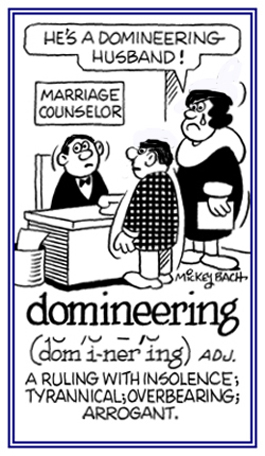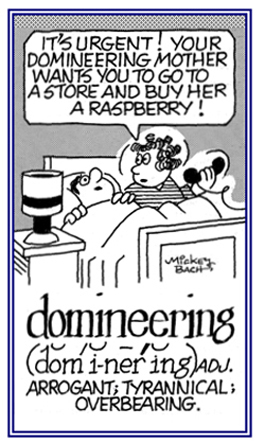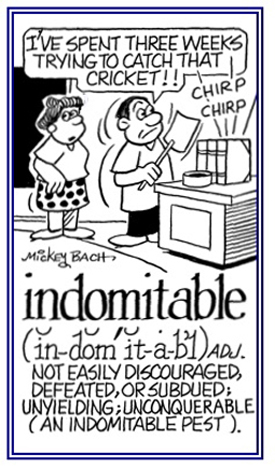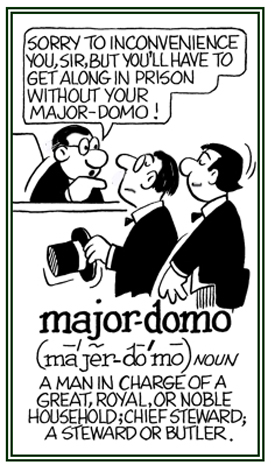dom-, domo-, domat-, domato-
(Greek > Latin: house, home; master or lord of the house)


Go to this Word A Day Revisited Index
so you can see more of Mickey Bach's cartoons.
2. Someone's influence or control over others: In Jack's story book, the king had dominion over his kingdom and had complete power and authority over all the people who lived there.
3. The land governed by a ruler; kingdom, nation: In Mary's book, the dominions of the great king extended to the sea.
There is still no consensus as to the etymology of domotics. One definition says it means: blending of Latin domus, "house", with robotics.
Additional sources (www.domotics.com, www.answers.com; and others) state: "The term domotics is a contraction of the words domus (Latin = home or house) and informatics (= the science concerned with the collection, transmission, storage, processing, and display of information)."
Some of the applications under the heading of domotics are sensors that automatically adjust lighting levels to meet the personal preferences of family members.
Other sensors may be adjusted to water plants according their need, or to vary the ventilation to make best use of outdoor climate conditions.
If there were a fire or break-in, the domotics would be able to call emergency services and explain in detail what is needed.
Some experts have described clever refrigerators that can read the wireless tags on food, determine when items are getting low and automatically reorder them. “Intelligent” washing machines will decide how much cleaning the garments should have.
What happens when more than one person is in the room and each one has a different preference?
Currently the most simple systems require that each person must wear a marker, such as an RFID (Radio Frequency Identification) tag, while the more sophisticated ones detect movement, body heat, and other individual characteristics.
Again, how will even the most sophisticated systems handle multiple preferences from a family or social group?
2. A Spanish gentleman or aristocrat: Some people remember California in the days of the dons.
3. A head of an organized crime family, especially in the Mafia: A don, or male boss, was found in a cafe in Italy.
4. Etymology: don, as a noun, comes from the 1520's, from Spanish or Portuguese don, a title of respect; which came from Latin dominus, "lord, master".
The university sense appeared about 1660 when it was originally part of student slang. The underworld or criminal sense came about 1952, from Italian don, from Late Latin domnus, which came from Latin dominus. The feminne forms are Dona (Spanish and Portuguese) and Donna (Italian).
2. To assume or to take on an attitude or to show one's feelings especially of grief or anger in a demonstrative way: He donned the manner of the injured party when he was not chosen.
3. Etymology: The verbal form of don appeared in about the early 14th century which came from Middle English as a contraction of do on, "put on".
2. Archaic term, the secure main tower of a castle; The dungeon, a keep or donjon, was very tall and surrounded by a large ditch with water.
This word comes ultimately from Latin dominus "lord, master"
This was derived from dominium "property" (source of English dominion), that in post-classical times became domino or domnio, meaning "lord's tower".
In Old French this became donjon, the term for a "castle keep", and eventually, by extension, a "secure (underground) cell". The form dungeon developed the specialized sense of strong closed cell, underground place of confinement; based on the French donjon (large tower of a castle).
2. Etymology: from Late Latin indomitabilis, "indomitable"; from
The extended meaning of "unconquerable" or "unyielding" was first recorded in Walter Scott's The Fair Maid of Perth in 1828. Walter Scott was a Scottish historical novelist, playwright, and poet, who was popular throughout much of the world in the 19th century.


Go to this Word A Day Revisited Index
so you can see more of Mickey Bach's cartoons.
2. Someone responsible for managing the affairs of others and making arrangements for them: Since the queen had so many important affairs to tend to, she gave the position of major-domo to a friendly and reliable person to provide the supplies and planning of such significant issues related to her status.
3. Etymology: from Latin major domus, "highest official of the household".

Go to this Word A Day Revisited Index
so you can see more of Mickey Bach's cartoons.
The Acacia trees in Central America are defended by ants and, in return, provide ants with food and shelter.
2. The state of being the most common or the greatest in number or amount: There was a predominance of chickens on the farmer's property in comparison to the number of cows that he had.
Max was told that there was a predominance of older people at the present time than at any other period in history.



